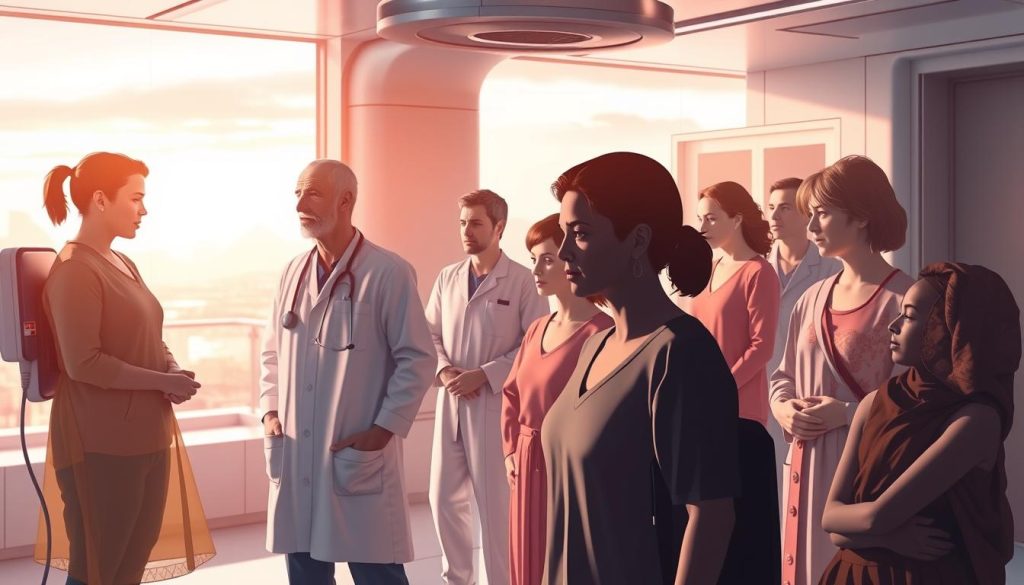CAR T-cell therapy is a new hope for some blood cancer patients. It’s a groundbreaking treatment that has shown great success. But, it’s important for patients and their families to know about the possible long-term side effects.
Like any medical treatment, CAR T-cell therapy comes with risks and complications. This guide will help you understand the long-term side effects. It aims to support you through the recovery process.
This article covers everything from the basics of the therapy to managing complications. We’ll talk about cytokine release syndrome, neurological issues, and the need for ongoing checks. Our goal is to give you a full picture of what to expect with CAR T-cell therapy.
If you’re thinking about this treatment, going through it, or have already had it, this guide is for you. Knowing about the risks and side effects helps you work with your healthcare team. Together, you can reduce long-term effects and improve your quality of life.
Understanding CAR T-Cell Therapy
CAR T-cell therapy is a new way to fight cancer. It uses the body’s immune system to attack cancer cells. This method has been very successful in treating some blood cancers, giving hope to those who have tried other treatments.
How CAR T-Cell Therapy Works
The steps to CAR T-cell therapy are:
- T-cells, a type of white blood cell, are taken from the patient’s blood.
- These T-cells are changed in a lab to find and kill cancer cells.
- More of these special T-cells are made in the lab.
- Then, they are put back into the patient’s blood.
- These T-cells find and destroy cancer cells, helping to get rid of the cancer.
This method is better than old treatments because it only targets cancer cells. It doesn’t harm healthy cells as much.
Conditions Treated with CAR T-Cell Therapy
Right now, CAR T-cell therapy is used for certain blood cancers. These include:
- Diffuse large B-cell lymphoma (DLBCL)
- Primary mediastinal B-cell lymphoma
- Transformed follicular lymphoma
- Mantle cell lymphoma
- Acute lymphoblastic leukemia (ALL)
- Multiple myeloma
Even though CAR T-cell therapy works well for these cancers, it’s important to know about car t-cell therapy long-term safety and car t-cell therapy adverse events. Knowing these risks helps patients and their families make informed choices about this treatment.
Common Immediate Side Effects of CAR T-Cell Therapy
CAR T-cell therapy is a breakthrough in treating blood cancers. But, it’s key for patients to know about the car t-cell therapy risks and complications. These side effects can happen right after treatment and vary in severity.
Here are some common immediate side effects of CAR T-cell therapy:
- Fever and chills
- Fatigue
- Nausea and vomiting
- Headache
- Muscle and joint pain
- Low blood pressure
- Fast heartbeat
How severe and long-lasting these side effects are can differ for each person. Some might just have mild symptoms that go away fast. Others might face more serious issues that need careful watching and support.
“It’s vital for patients getting CAR T-cell therapy to tell their doctors about any side effects right away. Quick action can help manage symptoms and avoid worse problems.”
The table below shows how common some immediate side effects are in CAR T-cell therapy trials:
| Side Effect | Incidence |
|---|---|
| Fever | 70-90% |
| Fatigue | 50-70% |
| Nausea/Vomiting | 30-50% |
| Headache | 20-40% |
| Muscle/Joint Pain | 20-40% |
While these immediate side effects can be tough, they’re often manageable with the right care. Next, we’ll look at the long-term car t-cell therapy complications and risks patients should be aware of.
Cytokine Release Syndrome (CRS)
One of the biggest car t-cell therapy adverse events is Cytokine Release Syndrome (CRS). CRS happens when the immune system gets too active. This leads to a huge release of inflammatory molecules called cytokines. This can cause a range of symptoms and serious problems.
Symptoms of CRS
The symptoms of CRS can range from mild to severe. Common signs include:
- Fever
- Chills
- Fatigue
- Headache
- Nausea
- Rapid heartbeat
- Low blood pressure
- Difficulty breathing
In severe cases, CRS can cause organ failure, like kidney or heart problems. Patients might need intensive care and support to manage these issues.
Management and Treatment of CRS
Managing CRS depends on how severe the symptoms are. Mild cases might just need supportive care, like lowering fever and managing fluids. But, severe cases might need more help:
| Severity | Treatment |
|---|---|
| Grade 1-2 (Mild to Moderate) | Supportive care, fever reduction, fluids |
| Grade 3-4 (Severe to Life-Threatening) | Tocilizumab (anti-IL-6 therapy), corticosteroids, organ support |
Quick recognition and treatment are key to reducing CRS’s impact. Doctors closely watch patients for signs of this issue and act fast. While most CRS cases get better with the right care, the risk of long-term car t-cell therapy side effects means ongoing monitoring is vital.
“CRS is a serious concern with CAR T-cell therapy, but we have made significant progress in understanding and managing this complication. With vigilant monitoring and timely intervention, we can help patients navigate this challenge and optimize their outcomes.” – Dr. Sarah Johnson, Oncologist
Neurological Toxicities
CAR T-cell therapy has shown great success in treating blood cancers. Yet, it comes with risks. Neurological side effects like confusion, encephalopathy, aphasia, and seizures are common. These car t-cell therapy complications can greatly affect patients’ lives and need careful monitoring.
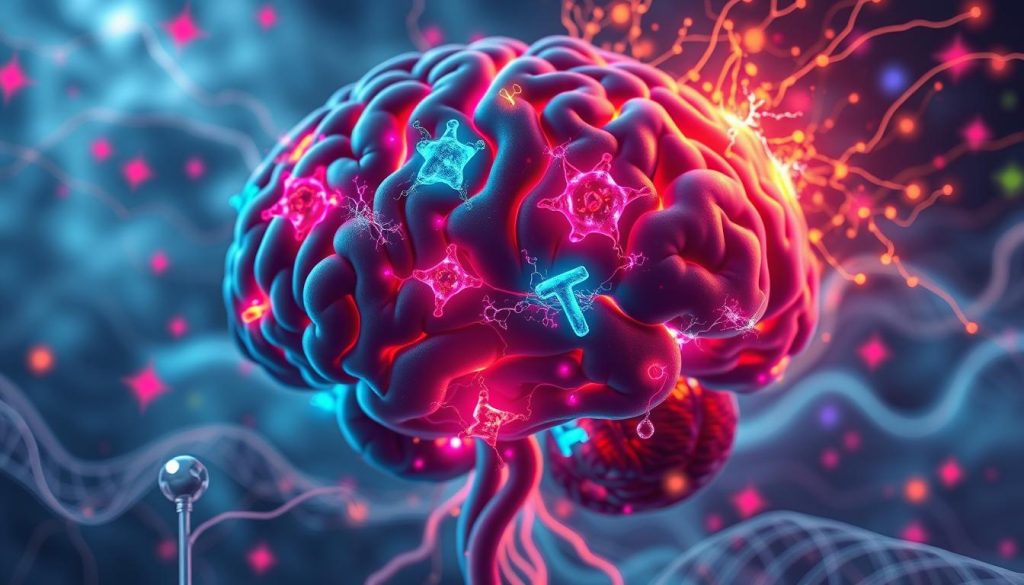
These side effects often start within weeks after treatment. But, in some cases, they can last longer or even appear months later. The severity can vary, from mild to severe, making long-term care vital.
Encephalopathy and Confusion
Encephalopathy, or brain disorder, is a common side effect. It causes confusion, memory loss, and trouble concentrating. These symptoms can make daily life hard for patients and their caregivers.
Aphasia and Seizures
Aphasia affects a person’s ability to speak, read, or write. It can make communication difficult, leading to frustration and isolation. Seizures, caused by abnormal brain activity, are also possible. They can be scary and need quick medical help.
| Neurological Toxicity | Symptoms | Management |
|---|---|---|
| Encephalopathy | Confusion, disorientation, memory loss | Supportive care, medication |
| Aphasia | Difficulty speaking, understanding, reading, or writing | Speech therapy, communication aids |
| Seizures | Abnormal electrical activity in the brain, convulsions | Anti-seizure medication, monitoring |
“Dealing with the neurological side effects of CAR T-cell therapy was one of the most challenging aspects of my cancer journey. The support of my medical team and loved ones was critical in getting through this tough time.” – Sarah, CAR T-cell therapy survivor
It’s key to quickly spot and treat neurological side effects from CAR T-cell therapy. Patients, caregivers, and doctors must work together. This teamwork is vital for managing these car t-cell therapy complications and improving patients’ lives.
long-term side effects of car t-cell therapy
CAR T-cell therapy has been a game-changer for some blood cancers. Yet, it’s key for patients and families to know about the long-term side effects. As more people live longer after treatment, knowing these risks and late effects is vital for their care and well-being.
Some major long-term side effects include:
- B-cell aplasia and immunodeficiency
- Secondary malignancies
- Prolonged cytopenias
- Graft-versus-host disease (GvHD)
- Cardiovascular complications
- Endocrine disorders
The impact of these side effects can differ for everyone. It depends on age, health, and the CAR T-cell product used. Some may face many complications, while others might have few or none.
“As a cancer survivor treated with CAR T-cell therapy, I’ve learned that the journey doesn’t end when treatment is over. It’s important to stay vigilant and work closely with your healthcare team to monitor for any late effects.” – Sarah, lymphoma survivor
The table below outlines the long-term side effects of CAR T-cell therapy and their symptoms or complications:
| Long-Term Side Effect | Associated Symptoms or Complications |
|---|---|
| B-cell aplasia and immunodeficiency | Increased risk of infections, need for immunoglobulin replacement therapy |
| Secondary malignancies | Development of new cancers, such as myelodysplastic syndrome or acute myeloid leukemia |
| Prolonged cytopenias | Anemia, fatigue, thrombocytopenia, bleeding risks |
| Graft-versus-host disease (GvHD) | Skin rashes, gastrointestinal symptoms, liver dysfunction |
| Cardiovascular complications | Arrhythmias, heart failure |
| Endocrine disorders | Thyroid dysfunction, adrenal insufficiency, diabetes |
In the next sections, we’ll explore each long-term side effect in detail. We’ll look at their causes, symptoms, and how to manage them. By understanding these risks and late effects, patients and their healthcare teams can work together to achieve the best outcomes and quality of life after treatment.
B-Cell Aplasia and Immunodeficiency
One major side effect of CAR T-cell therapy is B-cell aplasia. This happens when the modified T-cells attack and destroy both cancer cells and healthy B-cells. This loss of B-cells weakens the body’s immune system, making it harder to fight off infections.
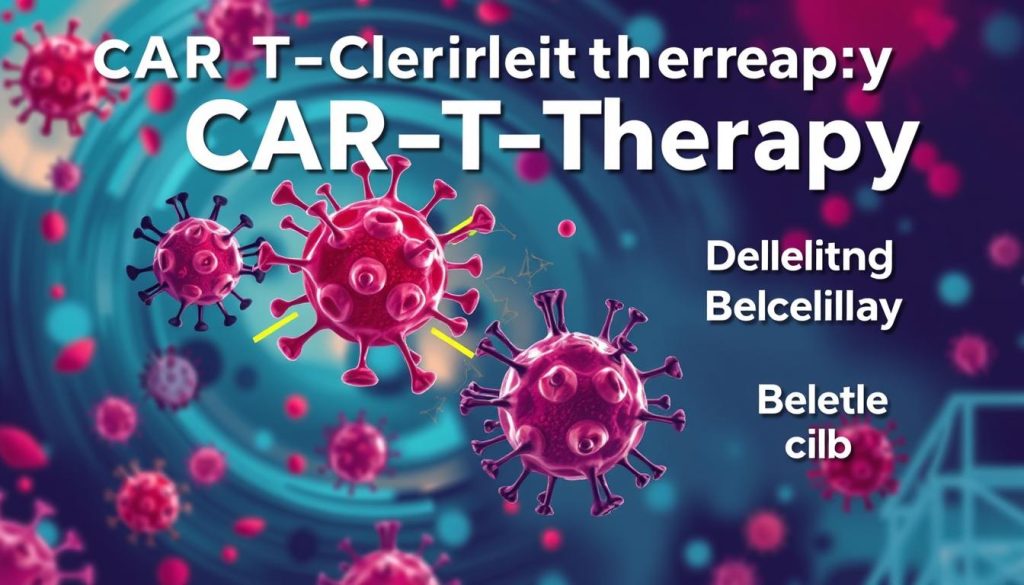
Patients may face long periods of B-cell aplasia, sometimes lasting years. During this time, they are more likely to get infections. These infections often come from bacteria like Streptococcus pneumoniae and Haemophilus influenzae.
Increased Risk of Infections
After CAR T-cell therapy, patients often get infections. Studies show that up to 70% of patients get infections in the first year. These infections can include:
- Upper respiratory tract infections
- Pneumonia
- Urinary tract infections
- Sepsis
They might also get infections that opportunistic pathogens cause. This includes fungal infections and viruses like cytomegalovirus (CMV) or Epstein-Barr virus (EBV).
Immunoglobulin Replacement Therapy
To lower the risk of infections, patients often get immunoglobulin replacement therapy (IRT). IRT uses immunoglobulins from healthy donors to help fight off infections.
| Route of Administration | Frequency | Advantages |
|---|---|---|
| Intravenous (IVIG) | Every 3-4 weeks | Rapid infusion, higher peak levels |
| Subcutaneous (SCIG) | Weekly or biweekly | Home administration, fewer systemic side effects |
How long IRT lasts varies by patient. It depends on when B-cell function returns. Regular checks on immunoglobulin levels and B-cell counts are key. They help manage side effects and prevent infections in these patients.
Secondary Malignancies
While CAR T-cell therapy offers hope for patients with certain blood cancers, it’s important to know about car t-cell therapy complications. This includes the risk of secondary malignancies. These cancers can appear months or years after treatment, adding to the car t-cell therapy long-term toxicity.
Studies show that CAR T-cell therapy patients may face a higher risk of:
- Myelodysplastic syndrome (MDS)
- Acute myeloid leukemia (AML)
- Lymphomas
- Solid tumors
Several factors contribute to these secondary malignancies. These include:
- Chemotherapy and radiation before CAR T-cell therapy
- Genetic predisposition
- Long-term immunosuppression after treatment
A study in the Journal of Clinical Oncology found the following rates of secondary malignancies in CAR T-cell therapy patients:
| Secondary Malignancy | Incidence Rate |
|---|---|
| Myelodysplastic syndrome (MDS) | 3.5% |
| Acute myeloid leukemia (AML) | 2.1% |
| Lymphomas | 1.8% |
| Solid tumors | 1.2% |
“The risk of secondary malignancies following CAR T-cell therapy highlights the need for long-term monitoring and follow-up care for patients who have undergone this innovative treatment.”
While the risk of secondary cancers is a concern, it’s vital to consider the benefits of CAR T-cell therapy. This treatment can be life-saving for patients with treatment-resistant cancers. Working closely with healthcare teams can help manage car t-cell therapy long-term toxicity and achieve the best outcomes.
Prolonged Cytopenias
After CAR T-cell therapy, some patients face long-lasting blood cell count issues. These issues can really affect a patient’s life and need careful watching by doctors.
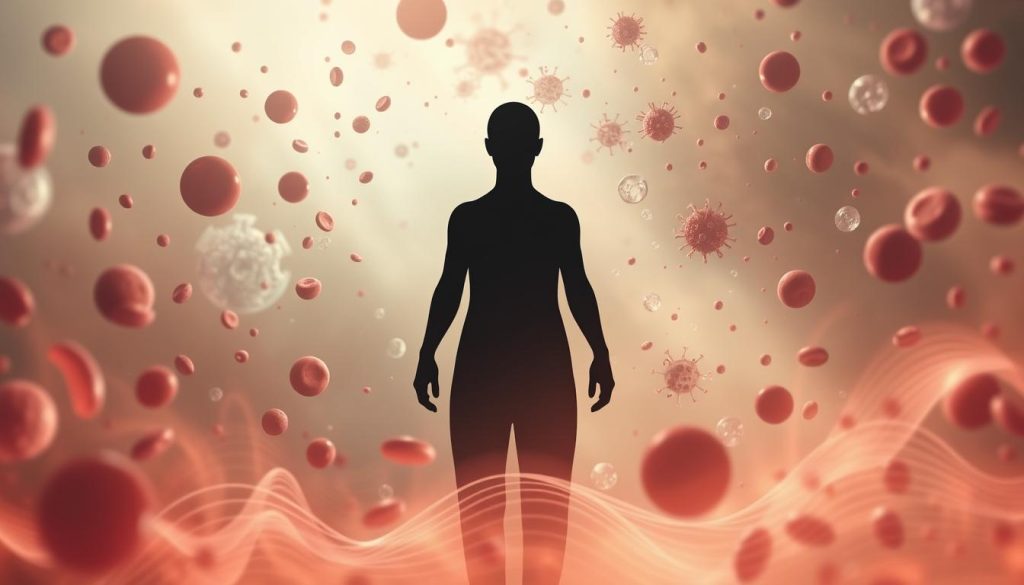
These blood cell count problems can show up in different ways. Each one has its own symptoms and challenges. Two common ones linked to CAR T-cell therapy are:
Anemia and Fatigue
Anemia, a lack of red blood cells, is a possible long-term side effect. Symptoms include:
- Fatigue and weakness
- Pale skin
- Shortness of breath
- Dizziness or lightheadedness
Anemia can make a person feel very tired and weak. Doctors might use blood transfusions, iron pills, or special medicines to help.
Thrombocytopenia and Bleeding Risks
Thrombocytopenia, a low platelet count, is another possible side effect. Platelets help blood clot, and low counts can lead to bleeding. Symptoms include:
- Easy bruising
- Petechiae (tiny red or purple spots on the skin)
- Nosebleeds or bleeding gums
- Prolonged bleeding from cuts or injuries
Those with thrombocytopenia might need platelet transfusions or medicines to stop bleeding.
| Prolonged Cytopenia | Symptoms | Management |
|---|---|---|
| Anemia | Fatigue, pale skin, shortness of breath | Blood transfusions, iron supplementation, erythropoiesis-stimulating agents |
| Thrombocytopenia | Easy bruising, petechiae, bleeding | Platelet transfusions, medications to prevent bleeding |
Handling these blood issues needs a team effort. Doctors, hematologists, and others work together closely. They keep an eye on blood counts and act fast to lessen these side effects’ effects on patients’ lives.
Graft-versus-Host Disease (GvHD)
Graft-versus-Host Disease (GvHD) is a possible long-term side effect of CAR T-cell therapy. It mainly affects those who have had allogeneic stem cell transplants. GvHD happens when the donor’s immune cells attack the patient’s cells, causing symptoms in different organs.
The risk of GvHD after CAR T-cell therapy varies. It depends on the T-cells’ source, the patient’s age, and other health issues. Symptoms can range from mild to severe and include:
- Skin rash or itching
- Gastrointestinal problems (diarrhea, nausea, vomiting)
- Liver dysfunction (jaundice, elevated liver enzymes)
- Dry eyes or mouth
- Fatigue and weakness
GvHD severity is graded from I to IV. This grading is based on how much of the body is affected and how it impacts daily life:
| Grade | Skin Involvement | Liver Involvement | Gastrointestinal Involvement |
|---|---|---|---|
| I (Mild) | Rash < 25% of body surface area | Bilirubin < 2 mg/dL | Diarrhea < 500 mL/day |
| II (Moderate) | Rash 25-50% of body surface area | Bilirubin 2-3 mg/dL | Diarrhea 500-1000 mL/day |
| III (Severe) | Rash > 50% of body surface area | Bilirubin 3-15 mg/dL | Diarrhea > 1000 mL/day |
| IV (Life-threatening) | Generalized erythroderma with bullae | Bilirubin > 15 mg/dL | Severe abdominal pain, ileus |
Managing GvHD after car t-cell therapy requires a team effort. This includes using immunosuppressive drugs, supportive care, and constant monitoring. Early detection and treatment are key to reducing car t-cell therapy late effects and improving patient outcomes.
“Graft-versus-Host Disease is a challenging complication of CAR T-cell therapy, but with proper monitoring and management, we can help patients navigate this difficult journey and improve their quality of life.”
As CAR T-cell therapy advances, researchers are looking into ways to lower GvHD risk. They are exploring gene-edited T-cells and suicide genes to make therapy safer. Understanding and addressing CAR T-cell therapy’s long-term side effects helps healthcare providers support patients better during and after treatment.
Cardiovascular Complications
CAR T-cell therapy is a breakthrough for some blood cancers. Yet, it can cause long-term side effects, like heart problems. It’s key to watch for car t-cell therapy complications closely to act fast.
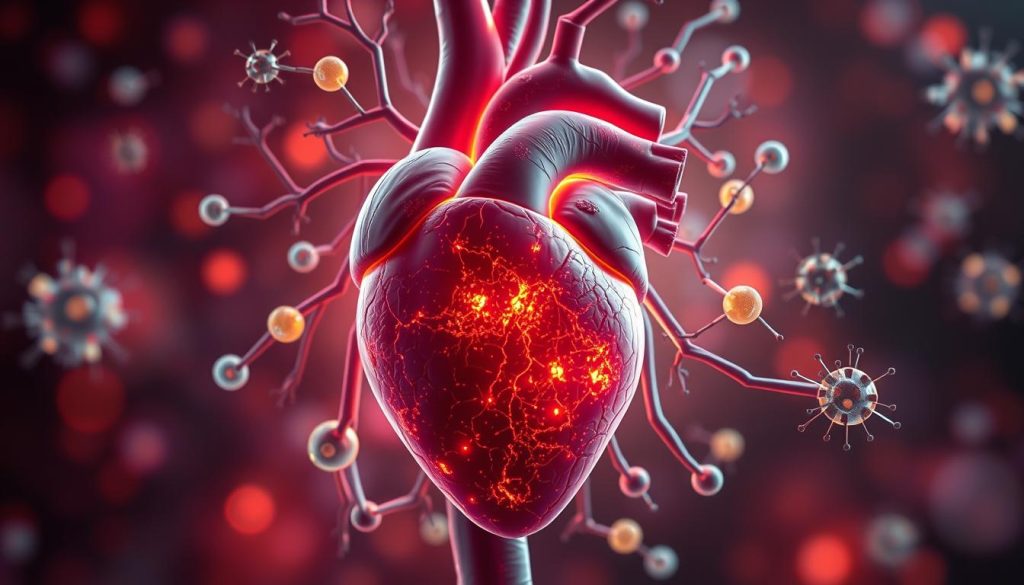
The therapy’s high cytokine levels can harm the heart and blood vessels. This might cause abnormal heart rhythms, from mild to severe. Symptoms include:
- Palpitations
- Dizziness
- Shortness of breath
- Chest pain
Heart failure is another risk, where the heart can’t pump well. This can lead to fluid buildup, causing swelling, fatigue, and coughing.
Arrhythmias and Heart Failure
How often heart problems happen with CAR T-cell therapy varies. A study showed these rates:
| Complication | Incidence Rate |
|---|---|
| Arrhythmias | 10-15% |
| Heart Failure | 5-10% |
Doctors keep a close eye on the heart before, during, and after treatment. They use ECGs, echocardiograms, and blood tests. They might give beta-blockers or ACE inhibitors to help the heart.
“Cardiovascular complications are a significant concern for CAR T-cell therapy patients. By staying vigilant and working closely with their medical team, patients can catch any issues early and receive appropriate care to manage these side effects.”
– Dr. Sarah Thompson, Oncologist
Research is ongoing to understand car t-cell therapy long-term toxicity better. This will help find ways to prevent and treat heart problems. Patients should talk openly with their doctors and report any new symptoms quickly.
Endocrine Disorders
CAR T-cell therapy is changing how we fight cancer. But, it’s important to know about the long-term car t-cell therapy side effects, like endocrine disorders. This treatment has been a game-changer for many, but it comes with car t-cell therapy risks.
Endocrine disorders, such as thyroid problems and adrenal insufficiency, can happen after CAR T-cell therapy. These issues might not show up right away. So, it’s key to keep an eye on patients who have had this treatment.
Thyroid issues, like hypothyroidism, are common after CAR T-cell therapy. Symptoms include feeling tired, gaining weight, being cold easily, and dry skin. Adrenal insufficiency is rarer but can cause weakness, low blood pressure, and imbalances in electrolytes.
Managing these endocrine disorders usually means hormone replacement therapy and regular check-ups with an endocrinologist. Catching these problems early is important. It helps avoid serious issues and keeps patients’ quality of life good.
“As we continue to push the boundaries of cancer treatment with CAR T-cell therapy, it is vital that we remain vigilant in monitoring and addressing the long-term side effects, including endocrine disorders.” – Dr. Sarah Thompson, Oncologist
The table below lists common endocrine disorders from CAR T-cell therapy and how to manage them:
| Endocrine Disorder | Symptoms | Management |
|---|---|---|
| Hypothyroidism | Fatigue, weight gain, cold sensitivity, dry skin | Thyroid hormone replacement therapy |
| Adrenal Insufficiency | Weakness, low blood pressure, electrolyte imbalances | Glucocorticoid replacement therapy |
As we learn more about the long-term car t-cell therapy side effects and car t-cell therapy risks, doctors and patients must team up. This ensures the best results and quality of life for those treated with this innovative therapy.
Monitoring and Follow-Up After CAR T-Cell Therapy
CAR T-cell therapy is getting better, helping more people fight blood cancers. But, it’s important to watch for long-term side effects. Patients and doctors need to stay alert for late complications.
Regular check-ups and working closely with doctors are key. This helps keep CAR T-cell therapy safe and effective in the long run. By being proactive, patients can improve their recovery and life quality after treatment.
Importance of Long-Term Monitoring
Monitoring is critical for CAR T-cell therapy patients. Some side effects may not show up right away. Regular visits and talking openly with doctors help catch problems early. This leads to better outcomes and less impact from late effects.
Recommended Follow-Up Schedule
The follow-up schedule varies based on the patient and the treatment center. Generally, patients see their doctors often in the first year, then less frequently in later years. These visits include physical exams, blood tests, and scans to check the patient’s health and watch for long-term side effects or cancer return.
FAQ
Q: What are the possible long-term side effects of CAR T-cell therapy?
A: CAR T-cell therapy can lead to several long-term side effects. These include cytokine release syndrome (CRS), neurological issues, and B-cell aplasia. Other effects are immunodeficiency, secondary cancers, and prolonged cytopenias. Graft-versus-host disease (GvHD), cardiovascular issues, and endocrine disorders are also possible.
Q: How long do the side effects of CAR T-cell therapy last?
A: Side effects from CAR T-cell therapy vary by person. Some, like CRS and neurological issues, might go away in weeks or months. But, B-cell aplasia and immunodeficiency can last for years. They need ongoing care and treatment.
Q: What is cytokine release syndrome (CRS), and how is it managed?
A: CRS is a serious side effect of CAR T-cell therapy. It causes fever, low blood pressure, and organ problems. To manage CRS, doctors use supportive care, tocilizumab, and corticosteroids in severe cases.
Q: Can CAR T-cell therapy cause neurological problems?
A: Yes, CAR T-cell therapy can lead to neurological issues. These include encephalopathy, confusion, aphasia, and seizures. These problems need quick action and ongoing care to improve patients’ quality of life.
Q: Is there an increased risk of infections after CAR T-cell therapy?
A: Yes, B-cell aplasia and immunodeficiency increase the risk of infections. Patients may need immunoglobulin replacement therapy and close monitoring to manage this risk.
Q: Can CAR T-cell therapy lead to the development of secondary cancers?
A: While rare, CAR T-cell therapy can increase the risk of secondary cancers. The risk depends on the CAR construct, previous treatments, and the patient’s health.
Q: How can prolonged cytopenias impact patients after CAR T-cell therapy?
A: Prolonged cytopenias can cause fatigue, weakness, and bleeding risks. These side effects need supportive care, transfusions, and ongoing monitoring to improve patients’ quality of life.
Q: What is the importance of long-term monitoring after CAR T-cell therapy?
A: Long-term monitoring is key to managing CAR T-cell therapy’s late effects. Patients should follow a recommended schedule and work closely with their healthcare team. This ensures the best outcomes and quality of life.












